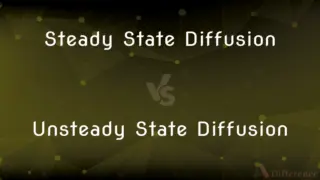Cues vs. Ques — What's the Difference?
Edited by Tayyaba Rehman — By Fiza Rafique — Published on December 8, 2023
"Cues" are signals or prompts; "Ques" is an informal abbreviation for questions. Both guide or seek responses.

Difference Between Cues and Ques
Table of Contents
ADVERTISEMENT
Key Differences
"Cues" are signals or indications that prompt action or response. On the other hand, "Ques" is a colloquial abbreviation for the word "questions," which seek information or clarification.
The word "Cues" has roots in theater, where actors receive cues to deliver lines or actions. "Ques," though not a standard English word, has emerged from informal written communication, especially in the digital age.
"Cues" can be verbal, physical, or situational triggers guiding behavior. For instance, applause serves as a cue for performers to take a bow. In contrast, "Ques" is a shorthand often used in casual contexts, like texting, to refer to queries or doubts.
Using "Cues" in the correct context ensures effective communication and desired responses. Conversely, "Ques" might not be universally understood, as it's a non-standard abbreviation and might cause confusion in formal settings.
In psychology, "Cues" are essential for understanding behavioral triggers and responses. "Ques," being an informal term, is best limited to relaxed communication environments where brevity is prioritized.
ADVERTISEMENT
Comparison Chart
Definition
Signals or prompts
Abbreviation for questions
Origin
Rooted in theater and performance
Emerged from informal communication
Standard Usage
Used in formal and informal contexts
Mostly in casual or digital contexts
Universality
Universally understood
Might not be recognized by everyone
Application
Found in theater, psychology, daily life
Used for brevity in texting or casual notes
Compare with Definitions
Cues
A rod used in games like billiards.
He picked up his favorite Cues for the pool match.
Ques
Non-standard term for doubts.
If you have Ques, just ask.
Cues
Behavioral triggers in psychology.
The experiment aimed to study the Cues leading to anxiety.
Ques
Shorthand in texting or notes.
Pls send me the Ques for the quiz.
Cues
Specific points in music or film.
The musician waited for his Cues before starting his solo.
Ques
Casual term for queries.
Any Ques before we move on?
Cues
Indications prompting a reaction.
The director gave the actor his Cues for the next scene.
Ques
Informal abbreviation for questions.
Do you have any Ques about the topic?
Cues
A signal in broadcasting.
Once he saw the light, he knew it was his Cues to start speaking.
Ques
Colloquial term for inquiries.
I'll address all your Ques at the end.
Cues
A long tapered stick with a leather tip used to strike the cue ball in billiards and pool.
Ques
Plural of que
Cues
A long stick with a concave attachment at one end for shoving disks in shuffleboard.
Cues
(Nonstandard) Variant of queue.
Cues
A signal, such as a word or action, used to prompt another event in a performance, such as an actor's speech or entrance, a change in lighting, or a sound effect.
Cues
A reminder or prompting.
Cues
A hint or suggestion.
Cues
An extract from the music for another part printed, usually in smaller notes, within a performer's part as a signal to enter after a long rest.
Cues
A gesture by a conductor signaling the entrance of a performer or part.
Cues
(Psychology) A stimulus, either consciously or unconsciously perceived, that elicits or signals a type of behavior.
Cues
(Archaic) One's assigned role or function.
Cues
(Archaic) A mood; a disposition.
Cues
The letter q.
Cues
(Games) To strike (a ball) with a cue.
Cues
(Nonstandard) Variant of queue.
Cues
To give a cue to; signal or prompt.
Cues
To insert into the sequence of a performance
Cued the lights for the monologue scene.
Cues
To position (an audio or video recording) in readiness for playing
Cue up a record on the turntable.
Cues
Plural of cue
Common Curiosities
What are Cues typically used for?
Cues are signals or prompts used to guide actions or responses.
Can "Cues" be both verbal and non-verbal?
Yes, Cues can be verbal, physical, or situational signals.
How are Cues significant in psychology?
In psychology, Cues help understand behavioral triggers and responses.
Is it appropriate to use "Ques" in formal writing?
No, "Ques" is informal and might not be universally understood in formal settings.
Is "Ques" a standard English word?
No, "Ques" is an informal abbreviation for "questions" and is not standard English.
Is there another meaning for "Cues" in sports?
Yes, "Cues" can refer to rods used in games like billiards or pool.
Is "Ques" an acronym for something else?
Not typically, but like any abbreviation, its meaning might vary based on context.
Can lighting serve as Cues in theater?
Yes, lighting changes can be Cues for scene transitions or actor movements.
Where is "Ques" commonly used?
"Ques" is often used in casual texting or digital communication for brevity.
How are Cues used in broadcasting?
In broadcasting, Cues signal when to start or stop actions, like speaking or playing music.
Can "Ques" be used interchangeably with "questions" in all contexts?
No, "Ques" is best suited for informal contexts and might not be recognized everywhere.
Do Cues always need a response?
Typically, Cues guide or seek a response, but not always.
Can animals be trained using Cues?
Yes, animals can be trained to respond to specific Cues, like commands or gestures.
Why might "Ques" cause confusion?
"Ques" might be mistaken for other words or not be recognized as an abbreviation for "questions."
Are there other abbreviations for "questions" besides "Ques"?
"Q's" is another informal abbreviation for "questions."
Share Your Discovery

Previous Comparison
Steady State Diffusion vs. Unsteady State Diffusion
Next Comparison
Carbonic Acid vs. Carbolic AcidAuthor Spotlight
Written by
Fiza RafiqueFiza Rafique is a skilled content writer at AskDifference.com, where she meticulously refines and enhances written pieces. Drawing from her vast editorial expertise, Fiza ensures clarity, accuracy, and precision in every article. Passionate about language, she continually seeks to elevate the quality of content for readers worldwide.
Edited by
Tayyaba RehmanTayyaba Rehman is a distinguished writer, currently serving as a primary contributor to askdifference.com. As a researcher in semantics and etymology, Tayyaba's passion for the complexity of languages and their distinctions has found a perfect home on the platform. Tayyaba delves into the intricacies of language, distinguishing between commonly confused words and phrases, thereby providing clarity for readers worldwide.














































